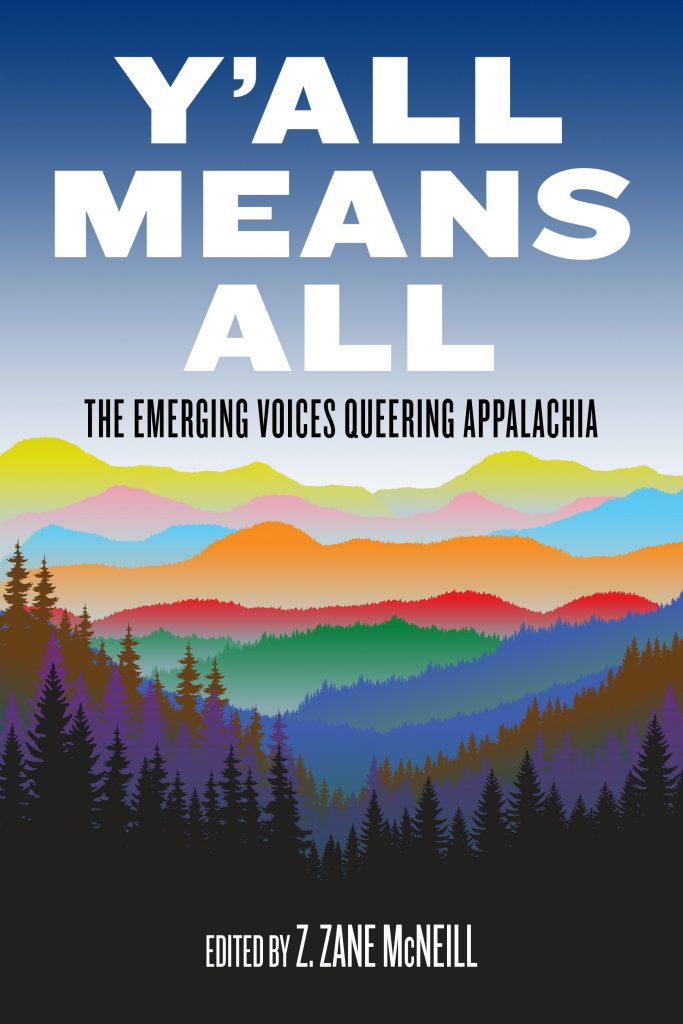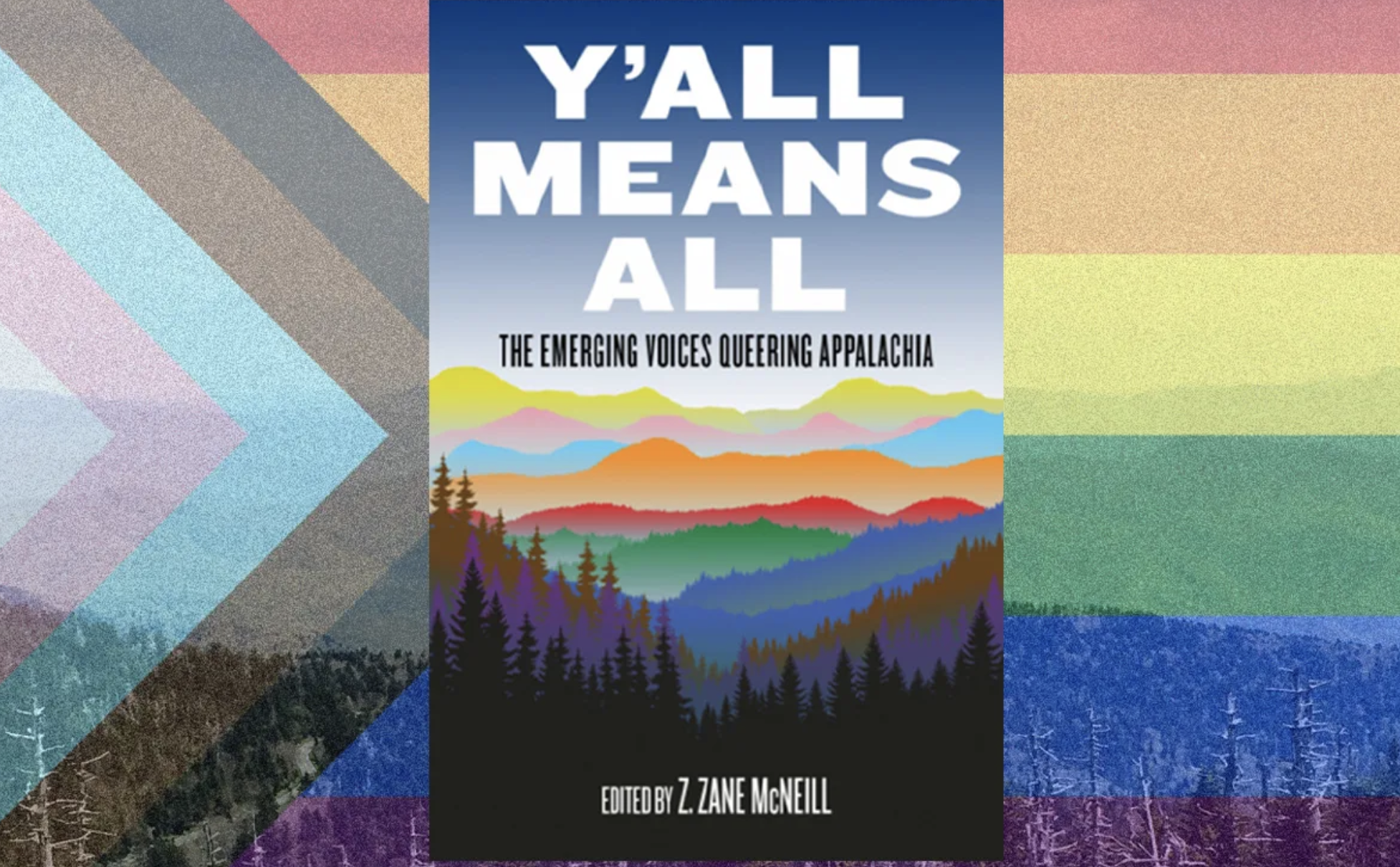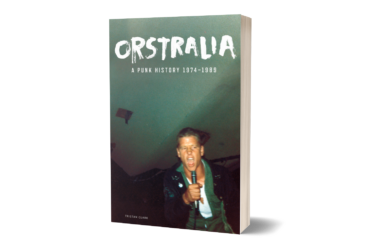By Raechel Anne Jolie
Belt Mag
June 2022
A conversation with Z. Zane McNeill, editor of ‘Y’All Means All’
Y’all Means All: Emerging Voices Queering Appalachia is a new collection of essays from PM Press, featuring critical, nuanced reflections on a misunderstood region. The editor, Z. Zane McNeill, sat down to talk with us about how the book came to be, its importance in this moment, and more.
This interview has been edited for length and clarity.
Raechel Jolie: Hi Zane, thanks for chatting with Belt Magazine today! Can you tell us what made you want to put this collection together?
Zane McNeill: So it has actually a really long, messy history. I started thinking through my own sexuality and gender in a more open way in about 2018. I identified in different ways since like 2015, 2016, but it was 2018 when Queer Appalachia had just come out with their zine Electric Dirt–and that was the first time I saw a kind of queerness that felt like me and like the first time I had queerness in, like, my own tongue or like my own language. The way they conceptualized it and spoke about it as not just an identity, but also a politics. That discourse really connected with me.
And so I met this great community from that space and started my own zine called Marx in the Mountains. And I was actually in Budapest, Hungary when I was doing this. And so I was really far away from home, which I feel like is a very ex-pat story, right? Not only being completely out of the country to recognize my queerness, but also my Appalachian-ness. I was kind of ashamed of my Appalachian and West Virginian identity because of all the stereotypes and caricatures around the region.
And so by 2018, I’m in Budapest, Hungary, which is sort of this really weird kind of fascist space. They had actually been pushing my university out of the country and they had been making it illegal to say “gender studies.” And my friends were getting beaten up for being gay and the gay clubs were being raided. And it was in that very weird, tumultuous space where I actually was able to understand and see myself, partially because of being really far away and just away from everything I knew and being able to have some space from that.
More: Rust Belt Pride
So I started my zine, Marx in The Mountains, where we talked about Leftist politics in Appalachia–it was a mix of queer poetry, very DIY stuff, and then also me doing oral histories with my friends about what queerness and leftism and revolutionary politics in Appalachia could look like. And those of us who worked together on those things were like, “Why don’t we actually turn this into a book?” And there were so many people who were ‘activist-scholars’, which is kind of how I identified at the time. And we are people who are mostly from West Virginia and Appalachia, who ourselves are queer. And within the academy we’re told that our position makes this not real research, right? Or this isn’t academic enough.
So that’s the whole background behind this book: a lot of different people from different ways and walks of life. We wanted to show that we’re not a monolith. We had just come out of this J.D. Vance perspective, Opioid epidemic, and Trump Appalachia. But [our book] really isn’t a response to all of that directly, because there’s other great work like Appalachian Reckoning and other spaces where they targeted that directly. What we wanted to do was do something completely different; a sort of celebration of all of our voices, and to make a space so that other voices would come later. We see it as an activist archive.
RJ: Yeah, that’s amazing. That’s beautiful. This next question, I think you kind of started to get to some of this in what you’ve already said, but the collection is definitely an intersectional one–it’s connecting sexuality and geography. But all of the essays also interrogate other positionalities–from race to class to disability to relationships to colonization. Can you talk about why it’s important to illuminate the complexity of identities and different relationships to power among queer Appalachians?
ZM: Yeah, so there’s a really great history in Appalachian studies of always having a ‘talk and response.’ Because Appalachia as a region has been culturally constructed to allow for exploitation. And so there’s all this really great counter-narrative scholarship that happens in Appalachia that you don’t see in other disciplines. Appalachia Studies as a discipline is inherently sort of activist because of that position. And so coming from that space, you’re always thinking through how classism and white supremacy and colonialism and environmental racism and ableism are all interconnected. And it’s very visible when you look at Appalachia and then especially if you’re looking at the way media portrays Appalachia or these narratives about Appalachia, about the body, about the space as a cultural or geographic or political creation. You can’t really distinguish these as separate.
And being Appalachian holds a lot of other identities–very often being Appalachian and queer and poor and trans and neurodiverse. A lot of us lived at these intersections, and we can’t distinguish scholarship or different kinds of intersections of oppression or marginalization from one another because of that. And so when we’re thinking through what Appalachia is for us or what the history of queerness is, or what queer Appalachian even means, we can can’t really distinguish these as separate.
RJ: Totally. There’s been a slew of recent laws working to criminalize parents and doctors and teachers who support trans kids. And this led to a lot of discourse on Twitter. There was a giant thread that blew up from somebody who put a map saying ‘here are places where these laws aren’t passed, so move your family there.’ There was this whole discourse about moving to “safer places” for queer and trans kids. Do you think your book troubles the response of this notion of, like, a “safe state”?
ZM: Yeah, [the same thing is coming up] around the potential overturning of Roe v Wade, right? Safe or unsafe states. So West Virginia has a law on the books that passed by a very marginal percentage that if Roe v. Wade is overturned, that abortion’s automatically illegal. But people don’t know that and they are like, ‘why don’t you leave the South?’ And the first thing I say to that is: think of who the South actually consists of. It’s a lot of queer and trans people with a lot of queer and trans people of color, you know, who do not have the resources and who shouldn’t have to move.
There are more histories of resistance and really cool revolutionary work in the South, in West Virginia, than in a lot of other spaces. And so when you’re discounting the South as redneck or the Confederacy, you’re missing a huge amount of the story. And you’re really writing off the people doing the most transformative work and who have the most to lose because they’re in these states, which is another way to abandon queer and trans people of color. So that’s the first thing I’ve been thinking of.
More: Madeline Davis’s Queer History of Buffalo
So instead of being like, ‘hey, why don’t you just leave?’ we can think of it as a call to arms. And it has been for decades. And Black women and queer people of color have been saying that for forever. And then the other thing is, like Appalachia has a huge number of trans people. It’s a huge space. And West Virginia has the highest percentage of trans youth. And there are some of the best, most active activists in these spaces doing harm reduction work and trying to protect these kids. And so when people talk about leaving, it just doesn’t make sense because you’re writing off so many people and you’re saying either ‘get the resources to leave,’ which does not make sense from an economic perspective in Appalachia, with our history of marginalization and resource destruction. And you’re also abandoning the trans kids who have to or want to stay for any reason.
RJ: Yeah, absolutely.
ZM: And also this idea of West Virginia as an automatically unsafe space just doesn’t make a lot of sense either. If you talk to trans people in Appalachia, like, there’s a lot of things that are hard about being trans in Appalachia and outside of Appalachia. But personally, I feel much more comfortable in my transness when I go back home and I feel much safer than being in other spaces.
RJ: Yeah, totally. I think both in the book and in your response here, we see community, we see mutual aid, we see how so much of that infrastructure kind of already exists. There’s this organic way of taking care of each other that I think happens in marginal spaces, not in spite of the region perhaps but maybe because of it.
ZM: And other states should learn from the work that’s happening in Appalachia and in West Virginia because we do a lot of things really right.
RJ: Yeah, exactly. So my guess is that most essays that you received sort of felt familiar. You probably had an idea of some of the things that would be written about. But were there any essays that surprised you or taught you something about your region that you hadn’t thought about before?
ZM: So I went into this knowing the people I was going to work with. But all of our work is so wildly different and we’re so different than when we started this, right? This book started in 2018 and then throughout the writing and publishing process, COVID occurred. So not only did the book and the authors change, but then also the world changed. And we changed with it. And then another interesting thing is the community we created from this collection [the writers and contributors] have just been in so many conversations and on so many projects with each other. And so I feel like how I understand queerness now is built from this dialogue and this community that this book helped create and this book came out of.
But more to your question, there were definitely some chapters that really were fun to read. There’s one by Brent Watts, which is, like, on Mothman as a queer icon. And that analysis was a completely different perspective than I had before reading it. Probably the most different chapter in the collection is by Aaron Guest, who is a gerontologist. Most of the authors are sort of younger Gen Z or millennial queers in Appalachia. But Aaron was interviewing queer elders in Appalachia and what their health needs are. And that’s a story that isn’t there. You know, not only is there a huge issue with LGBT health in general, but LGBT health in Appalachia specifically because of our health issues of environmental degradation and poverty. So his interviews are a huge resource that I feel like hasn’t been explored and we were really excited to have him on.
[We] also have really cool chapters from photographers, from critical dance scholars, you know, and just–it’s a really fun sort of hodgepodge of activists and journals and creative writers and makers all from those DIY cultures. We want to make the space better and we’re tired of people telling our stories. And so that’s really what connects all of it. But [the pieces are] also different from one another, which is why it’s so fun to read.
RJ: Totally. Super eclectic, definitely something for everyone.
ZM: Yes, I think someone said it was like a queer quilt of Appalachian voices.
RJ: Oh, I love that. Okay, last question. The collection does, I think, feel ultimately very hopeful, even when hard things are addressed. How do you think people can use the wisdom and reflections from the book to better show up for social change, whether around regional struggles, sexuality and gender, or anything else?
ZM: Something that was really important to us was challenging the defeatist and negative discourse around Appalachia. And it’s like, why would any queer people choose to live there? There’s this metronormativity to that, which is finally being challenged. And this book is one of the things doing that, in addition to other people’s work. And we wanted to say, ‘yeah, there are issues here not unlike the rest of the country or the rest of the world. And there are things we’re fighting for so fiercely to make it better.’.
So from this internal community space, we wanted to say, yes, we have our issues, but we are imagining possibilities and queer Appalachian futures. And so that’s sort of what’s underlying this whole collection, is a vulnerability and an honesty and a real dedication to the region and ourselves and our communities. And a real optimism about what we can do and what the region can be in the future. y working in solidarity with other communities and imagining a settler-free queer space that really fights for environmental justice, and imagines the body as something powerful. And so that’s the kind of spirit we hope people leave with.
More: A History of the Pride Flag in My Doorway
Something that was really important to us was challenging the defeatist and negative discourse around Appalachia. And it’s like, why would any queer people choose to live there? There’s this metronormativity to that, which is finally being challenged. And this book is one of the things doing that, in addition to other people’s work. And we wanted to say, ‘yeah, there are issues here not unlike the rest of the country or the rest of the world. And there are things we’re fighting for so fiercely to make it better.’.
So from this internal community space, we wanted to say, yes, we have our issues, but we are imagining possibilities and queer Appalachian futures. And so that’s sort of what’s underlying this whole collection, is a vulnerability and an honesty and a real dedication to the region and ourselves and our communities. And a real optimism about what we can do and what the region can be in the future. y working in solidarity with other communities and imagining a settler-free queer space that really fights for environmental justice, and imagines the body as something powerful. And so that’s the kind of spirit we hope people leave with. ■
Raechel Anne Jolie is Belt Magazine’s engagement editor.
Cover art by Chris Harvey.
Belt Magazine is a 501(c)(3) nonprofit organization. To support more independent writing and journalism made by and for the Rust Belt and greater Midwest, make a donation to Belt Magazine, or become a member starting at just $5 a month.







